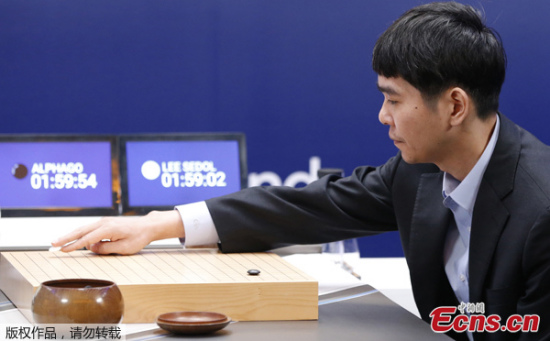
World's top Go player Lee Sedol puts a white stone against Google's artificial intelligence program AlphaGo in Seoul, South Korea, March 13, 2016. (Photo/Agencies)
AlphaGo may have achieved historic triumphs over professional players of board game Go, but China's artificial intelligence (AI) companies are keener to make robots address day-to-day needs.
Room service robots, robot bank tellers, and voice-controlled personal assistants were the hot topics at an AI forum in Beijing on Thursday. Participants said they were expecting a boom in sales of service robots in the next five years in China, as the country's AI revolution accelerates.
"2015 was the year when AI finally entered our everyday world," said Zhi Tao, co-founder of Yunji Technology, whose robots have been deployed in hotels in Beijing, Shanghai and Suzhou to cater to guests' needs.
Zhi said her robots can not only take voice commands from humans, but can increasingly "give orders" to other machines, thanks to better speech recognition technology.
The most impressive AI breakthroughs last year were in voice recognition, said Liu Qingfeng, board chairman of tech firm iFLYTEK. Devices can now recognize speech with an accuracy of over 90 percent.
With improved speech recognition, more machines will be able to follow spoken instructions, and "that will make AI devices more 'intelligent' and will allow more man-machine interaction," said Cid Wang, president of Ninebot Inc.
Meanwhile, consumers are adopting more smart machines as better AI becomes available.
Jiang Hongrui, a technology director at Chinese telecom firm Huawei, cited the popularity of Amazon's Echo, an audio device which can request an Uber ride, read audio books and manage schedules following the user's voice orders. Jiang predicted that demand for such virtual personal-assistant products will continue to rise.
The government has also pledged support for the sector. The Ministry of Industry and Information Technology said on Wednesday that the Chinese market for service robots will be worth 30 billion yuan (4.6 billion U.S. dollars) by 2020.
However, iFLYTEK Vice President Hu Yu warned that competition will become extremely fierce with the boom.
"The marketplace will quickly weed out the losers, and only those that have a clear niche and real technology breakthroughs will survive. If your robot cannot add value to consumer's daily lives, you will die," Hu said.







